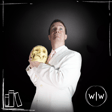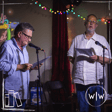Become a Creator today!Start creating today - Share your story with the world!
Start for free
00:00:00
00:00:01

235 Jackson P. Brown | Urban Fantasy Author
Urban fantasy writer, Jackson P. Brown is here chatting about breaking into the publishing industry, the journey of a debut author and her love of anime and manga.
Support the show on Patreon! 💖 And get extended episodes, ad-free and a week ahead of everyone else. 🙏
For audio listeners:
Listen to The Chosen Ones and Other Tropes, Jamie's other podcast with Melissa Welliver and Naomi Gibson! 📚
Follow on socials! 🥳
Transcript
Introduction and Writing Challenges
00:00:00
Speaker
Ooh, a spicy question. I love Because the writing sort of everything, right? You can fix plot holes, but if the writer... So some readers love that and some readers are like, but I wanted more of this. So it's kind of a gamble.
Guest Introduction: Jackson P. Brown
00:00:14
Speaker
Hello and welcome back to the Right and Wrong podcast. On today's episode, I am joined by a London-based urban fantasy writer and anime and manga enthusiast. It's Jackson P. Brown. Hello.
00:00:26
Speaker
hi Thank you for having me. Oh, it's such a pleasure to to be speaking with you. I'd like to jump right in with these episodes.
Debut Novel: 'The Reaper'
00:00:33
Speaker
so Let's kick things off by talking about the book, your debut novel, The Reaper, which is out on the 10th of July.
00:00:39
Speaker
Tell us a little bit about it. Yeah, so it's a London-based urban fantasy. um That reimagines the Grim Reaper as a supernatural assassin born of a killing curse.
00:00:52
Speaker
And he meets a Jamaican empath during the awakening of his powers. And together they team up to solve crimes in London. And whilst they're doing all of this, there is a secret city underneath London where all of the magical creatures live.
00:01:08
Speaker
And they sometimes wreak a bit of havoc. Sometimes.
Influences of Terry Pratchett
00:01:13
Speaker
um When I think of, it's funny because when I think of the Grim Reaper in literature, and it's been used a lot, but for me, my my touchstone is Terry Pratchett's characterization of death. Obviously, that is a far and distant interpretation to yours. But what what made you want to write a story about the Grim Reaper?
00:01:32
Speaker
To be honest with you, he does play a role in this and because um and when i was a teenager, I just had an interest in these types of stories about death and like Grim Reapers and things. And um I had written a short story for my English literature coursework about a young girl who can see the Grim Reaper.
00:01:51
Speaker
And when I told my mum about it, she was like, oh, have you read Terry Pratchett yet? And then she borrowed me her copy of Mort and then she... that kind of contextualised it for because it's such a strange um ah version of death.
00:02:04
Speaker
And I think it just gave me the confidence to play around a bit more of the concept that you can really do whatever you want with it um as long as they're just, the theme is around, you know, killing or death in some way.
00:02:18
Speaker
Yeah. And yeah. But it doesn't have to be, yeah, but the thing Terry Pratchett's Grim Reaper taught me is that like it doesn't have to be scary and dark and stuff. He's actually very like gentle and kind in some ways.
00:02:30
Speaker
Yes, yes. So my one, he is he's quite polite. you know He likes drinking tea. He's quite posh as well. So he's quite middle class and everything. And he, yeah, he has just a lot of comforts and things. So yeah, that's where some of the humour comes in because um the empath, she's much more Yeah.
00:02:49
Speaker
Bolshie and that they make a nice team together. Okay. So it sounds like the part of this was sort of influenced by ah Terry Pratchett sort of origin loosely.
00:03:00
Speaker
And then you mentioned that there's comedy. is it Is it important to you that there is like a funny side to all these things, that there is a likeness to it?
Using Humor to Balance Dark Themes
00:03:08
Speaker
Yeah, because some parts of the story can get quite dark and because in this one they are trying to track down a criminal warlock's people trafficking ring.
00:03:17
Speaker
So there are quite a lot of dark moments and there's a lot of discussion on um racism and abuse so things like that in the story. So I do think you do need those moments of um lightheartedness just to keep the story clear.
00:03:30
Speaker
you know, not too depressing really. Yeah. Yeah. Just to level things out, if only a little bit. yeah Um, and it's set in London. You yourself are from London. I'm guessing a lot of the places that are explored in the book are also places that you're familiar with.
London Setting in 'The Reaper'
00:03:46
Speaker
Yeah, I guess anyone who's visited London will definitely spot some places. I mean, they go to Covent Garden and they're in the the main museums. They're around South Kensington. They go to Harrods.
00:03:57
Speaker
and The first chapter tu is in Dishoom. I love Dishoom. Yeah, so do I. think So there's a lot of places there where people will recognise Dishoom.
00:04:08
Speaker
and I mean, the Grim Reaper himself, he lives in St. Pancras Station in the Renaissance Hotel. So um yes, there's definitely places that you can spot and you'll be like, oh, I've been there before. Okay, okay. So if if you if you were really into it, you could probably do the the tour, the Reaper tour of London.
00:04:24
Speaker
Yeah, definitely. Yeah. And dialing it back a bit, um I'd love to hear but bit more about you and your kind of like experiences with writing and and publishing.
Writing Background and Inspiration
00:04:36
Speaker
How much had you have you written before The Reaper? Yeah, I've always been writing, probably since like primary school. So the book, um but one one of the dedications is to my primary school teacher, Miss Matthews, because she was one who told me, you have to keep writing.
00:04:52
Speaker
um So I've always loved writing. um And before The Reaper, I had written two novels and that I had tried to query to agents. The second one was a dystopia.
00:05:04
Speaker
And I had... them It hadn't really been getting a lot of legs, but had entered it into a competition. um And that kind of put me on the path to getting The Reaper published, actually, which is strange because I was told that at the time dystopia wasn't really a thing, but now it's really coming back. um So I've got it like on the back burner, just waiting for a time to to polish it up again and maybe submit it.
00:05:29
Speaker
Yeah, it's so funny. I think it was yeah it was about five years ago or so. And everyone everything I heard about publishing was that dystopia is not popular and YA is not popular. And that's totally the opposite of, I think, what things are like now.
00:05:43
Speaker
Yeah, no, that they're both really popping off again, especially dystopia. I mean, this year there's been about, I think, three or four major dystopias coming out this year. So, yeah. Which is probably a worrying reflection of the state of the world, but...
00:05:58
Speaker
Yeah, it's weird, isn't it? You know, it's a bit speculative. um So you've been writing forever. whilst And you had two kind of fully finished novels before you did The Reaper.
Influences and Writing Courses
00:06:12
Speaker
Whilst you were cutting your teeth on like those earlier novels, that earlier writing, did you ever do any writing courses or do you have any like craft books or anything like that? Yeah, I did do. um I did enroll in one writing course. It was like a ah local London one. um It was quite pricey. This was during lockdown. So we've been put on furlough as well. So I did have to to leave that one eventually because it was some of them are quite expensive. um yeah And when I was in uni, did do creative writing course as well.
00:06:44
Speaker
um So I've done like a few courses and I guess my favourite book, craft book, would be Stephen King's On on Writing. He just taught me a lot about it and how to be... um He's quite strict and he's quite um determined with like how much he writes a day and he really commits to it.
00:07:04
Speaker
So I guess that was kind of... It's always been inspiring for me just to... Even if it's like 300 words a day, ah just try to write something every day. Mm-hmm. Yeah, I think that's ah that's a healthy way of looking at it. he Stephen King, from what I know of that book, it is very extreme and it's like, you must treat it like a nine to five job and you must write from nine to five every day. Yeah.
00:07:23
Speaker
yeah Yeah. It's easy for him because you know that's all he has. Yeah. Yeah. It's easy when you're like one of the bestselling novelists of all time. Yeah. I wish I could write every day, but you have to do in between like childcare and work and things like that.
00:07:38
Speaker
Yeah, yeah, yeah, Okay. So if you were to recommend a craft book to people, that's the one that you would you would kind of go to? Yeah, it would be. It would be because i like how vulnerable he's in it as well because he kind of kind of weaves it into his life story too. So I feel like there's a bit of something for everyone in that book.
00:07:57
Speaker
If you think back to your kind of earlier writing and your earlier... whether it was a finished novel or just like the first novel you wrote, how much
Evolution of Writing Style
00:08:07
Speaker
of the sort of conceptualising and forming a novel process, has how much has that evolved for you since you first started?
00:08:15
Speaker
I think before i was... um Because i I was so much younger, I know that I really heavily just regurgitated everything that I was already reading and watching at the time. Yeah, okay. And was really into like fan fiction as well. So it's like when you have a lot of fanfic background and then you read a book that's really, really interesting and you find that a lot of the stuff is just...
00:08:39
Speaker
almost a fanfic version of what you've just just read. um So yeah, there was a lot of that going on when I was much younger. And then as I got older, I've had so many like periods where I've had years where I've just read the literary fiction or some years where I'm more focusing on like TV shows and films. So I think of the more I've ingested and consumed, I think it's definitely helped me see even just the different ways to start a novel and how some people, they have different experimental styles and things. And it does help to,
00:09:10
Speaker
I think it's helped me to find my own voice more than when I was much younger. and But it's still very much the same in terms of how I structure. I can't, I'm not someone who can really do like mind maps and things. My mind is too chaotic. So even to do a mind map, I think I'll get confused.
00:09:25
Speaker
So I have to just start from chapter to one and I just keep writing like chronologically. I just, I don't do the whole, like some people they do a chapter at the end and in the middle when they work up to it. I can't even do that. I'll just get confused.
00:09:38
Speaker
Yeah, the the advice I've heard on that ah in terms of if you write out of order, and i think yeah i think it's less people write out of order than, then but I think it's it's a minority. But the the advice I'd heard is that if you're really excited about a chapter and you've been thinking about something, but it happens way later in the story, you should just write it straight away because you've got all this excitement and energy for it. Whereas if you wait, you might not have that same energy when you come to actually write the chapter. Yeah.
00:10:05
Speaker
Which makes sense. Yeah, yeah no, it does. there i mean, there are some times when there'll be like a conversation between two characters um that I think I have to, so I don't forget, I'll quickly just put it in my, and the the notes app on my phone or something like that.
00:10:21
Speaker
um But terms of writing, like, you know, it'll have to always be little passages or little lines of of just conversations between characters rather than like a chapter.
00:10:32
Speaker
Yeah, okay. Stephen King wouldn't like that. i but As far as I know, he doesn't like notes. He doesn't believe in note-taking. fish So you've been in trouble with him.
00:10:44
Speaker
Um, and and then in terms of like how much your writing has developed, this is an interesting question because I find that once people, most people have been writing for for some time before they, they land their book deal.
00:10:56
Speaker
And a lot of the time going through the traditional publishing system, working with an agent, working with an editor that can really influence the way that you write. Do you think that has really informed your writing and and how you're
Anxiety of Writing the Second Novel
00:11:10
Speaker
going to write in the future?
00:11:10
Speaker
Yeah. Yeah, I think what realised is really eye-opening finally getting editorial feedback for my work. um And yeah, I've realised that sometimes my similes and metaphors, they can just do their own thing.
00:11:25
Speaker
You know, sometimes you have an image in your head and you're just, by the time, you know, you've you've written all out, it's just, it even make sense anymore. And so it's helped me to be a bit more economical with how I put things,
00:11:38
Speaker
you know, just like the little flair. You don't want to do too much. And I think before I definitely was someone who who did too much, you know, I can definitely like write too much. So I think it's helped me to, yeah, just scale it back a little bit and be be neater in how I get an idea across.
00:11:55
Speaker
um And yeah, helped me with like so much of my, just not even just with like the Reaper and the books that's part the series, but just everything that I've written since then. i think rather than, getting there in 10 words, ah just find a single word that can just properly, ah you know, convey what I'm trying to say.
00:12:14
Speaker
Yeah. Cause I, editors are very in tune with pace and like whether something needs to be concise or if something deserves more of a flourish on the page. yeah So I think that's, yeah, I think that's definitely something that there is often picked up on.
00:12:29
Speaker
And then my, my followup question to that is, uh, you, are you, am I right in thinking that you're writing a second novel for as a sequel to this, to the Reaper?
00:12:41
Speaker
Yes. Yeah. The edits are just with, um, yeah, it's with my editor now, the manuscript. Yeah. Okay. Right. So you're, you're well underway with that whole process. Um, second novels, I've spoken to lots of authors and they often talk about, or like look back on the second novel as something that they, they struggled with, I think more than they expected.
00:13:03
Speaker
So how are you finding the process of doing the second novel? think because so much of the story had already been like planned out in my head, I knew I wanted to happen in the book. So writing it was really quite simple for me. And I didn't really struggle with the writing. I think it is the just the anticipation.
00:13:21
Speaker
When I sent it off to my editors, I'm still waiting for their feedback, I think that's the first time actually felt genuinely nervous. ah Especially because now I'm in a situation where I'm talking to other people um debuts who are also writing their second books. And we have like a little chat, a chatter group chat, and they're all coming back and saying how the editors don't like their second book and don't like their sequels and they're having to write all over again. It's caused lot stress and anxiety. i didn't know that was even a thing that really happened.
00:13:51
Speaker
So hearing all those stories has actually made me quite nervous. so I have no idea how... the team feels about the sequel um especially because certain characters you know they have certain problematic moments and things um and so yeah i'm really kind of nervous to hear back from from them about it okay so we're we're speaking as in you haven't even they've just got the first draft you haven't yeah they just got the first draft so i have no idea how they feel about it yeah
00:14:20
Speaker
Well, fingers crossed. Hopefully they they love it and they only want to make minor adjustments to it and and you'll be good. But ah yeah, it's it's a funny old industry and kind of anything can happen.
Importance of Second Book's Direction
00:14:30
Speaker
um he But I mean, either way, it's a two book deal, right? So no matter what happens, youll you will be able to write a second book, which will be published by them.
00:14:39
Speaker
Yeah, actually it's a free book deal. So it's just like, yeah. So this book is really important that like, that it's, they like the direction because it will completely change how I do the third book and yeah.
00:14:50
Speaker
Okay. Right. Yeah. Is this like this kind of world, this story um with these characters, is that kind of the only thing that you, you, you're interested in writing right now, or do you have other ideas which are kind of ticking along in the background for different like standalones or, or, or stories or whatever?
Prolific Writing Beyond 'The Reaper'
00:15:08
Speaker
Yeah, I have quite a few stuff because I write quite um prolifically so I can have like several things on the go. So I've already written a in between writing the second book and the third books. I have a draft of the third book in the series already. So that's already done. Yeah. And then I've written two of other novels while i was weighing between edits for the re-part of the first book. So have them.
00:15:30
Speaker
Yeah. So yeah. ah though I don't know. have an issue. But yeah, um I have. So it's much more, it's much darker. It's a horror slash horror manch duology.
00:15:43
Speaker
um But they both work as standalones. But because they have like similar themes, I just told my agent I like them as, you know, two books, two like companion books, you might say. Right, yeah.
00:15:55
Speaker
So yeah, i've got I've got that going on. And um yeah, I've written like a few thousand words of like three different books that I have just, just, just thinking about, but they're more like epic fantasy, um and more like the high fantasy.
00:16:10
Speaker
And then there's one that's more like a dark comedy, dark fantasy comedy, I'd say. So yeah. Okay. Sounds like you've got quite a range yeah with on you there.
00:16:22
Speaker
Yeah. Yeah. That's cool. um that and And also, like you said, writing very prolifically. to To keep up that kind of pace, do you have like a schedule? Do you lock yourself in la Stephen King and do like, I'm going to write at this time every day in this place? Or is it as and when?
00:16:42
Speaker
It actually is more as and when. So when I'm really into the throes of it, the reason why I have to start a book when I'm really passionate about it, because I will just naturally consistently write every day until the whole thing is done.
00:16:54
Speaker
um So sometimes that would mean when um my son is in bed and everyone's in bed, I'll just write from like 9pm to like midnight and then just start to do it again the next day.
00:17:05
Speaker
And because my day job is in IT and I work from home, um If there is like a slow moment in the day, like during my break times and lunch times, I'll then write then as well. and Okay. That's just how I i'll get get the words in.
00:17:19
Speaker
Okay. and And you can, are you the kind of person that can write anywhere or do you need a specific, like, do you need like a, I need to be in in my writing spot at this with like a hot drink or ah you just good to go whenever?
00:17:31
Speaker
Yeah, no, it has to be somewhere where I'm just alone. So I can't really do it on like the train or something. I might sometimes when I'm feeling like really extra, I'll go to, don't know, like a cafe and find a table. But if a table isn't like in the corner, then I'll just go home. If, you know, I just won't bother because I can't, won't be able to get into the zone.
00:17:52
Speaker
um So yeah. I get it. Yeah. You need to hit that like flow state. And if there's too many distractions, that's, you're just going to get taken out of it. Exactly. yeah Yeah. Okay. Okay.
00:18:04
Speaker
um Before we head over to the desert island, I was looking online at your at your your website and some of your bios, and I saw that you are, as I mentioned in the intro, a self-procamed lover of anime and manga.
Anime and Manga Influences
00:18:17
Speaker
um And you mentioned before consuming all the different media, whether that be books, whether that be television, film, has all kind of influenced your storytelling and evolved it over time. Do you think if you brought elements of anime and and manga storytelling into your writing, because they they have some quite distinct forms within them,
00:18:37
Speaker
Yeah, they do. They do. I'll definitely say the fight sequences are inspired Oh, that's what I it would be. Yeah. A lot of the anime manga that I read, you know, it's like from Berserk and Bleach and Free Ren and, you know, there's just so much like big fantasy epics and the fight sequences are always so exciting. and So, yeah, and the fight sequences, but also a lot of the backstories because something that a lot of manga...
00:19:06
Speaker
authors they do they always have like these big tragic backstories or these big backstory sequences in their for their characters and so um yeah some of the side characters in the reaper um as they're kind of gearing up to battle they do have moments where they're thinking about their past and like how they got to be where they are so I do have a bit of that in there as well oh yeah yeah they're like they're like flashback in a monologue yeah yeah yeah At like what would seem like a very inappropriate time in real life. Yeah. so I but i had had too much of those. That was one of the edits. They said, okay, this is because the fight is actually happening. You're slowing down the pace here.
00:19:45
Speaker
So I did have to scale a lot of, a lot of that back during the final like third of the book. Okay. That's cool. Cause I thought it would be the fights. Cause there's something that I don't, it's hard to find in, in other mediums is the, and I would say I'm a casual enjoyer of anime. you know, I've watched the big ones. I've watched Bleach, actually, but I've watched Attack on Titan, Demons Left. Yes, Attack on Titan, yeah. um But there's something that they, the the the fight scenes, the sequences and action sequences in anime, there's something really fascinating about the way that it's
00:20:17
Speaker
it's sort of ah suddenly very fast and then suddenly stops and is very slow yeah and then suddenly very fast again. and And somehow it just keeps the pace and it keeps you riveted. And they do so much exposition during each of those things, which is just really cool.
00:20:33
Speaker
Yeah, yeah, that they do. They do. I think one of my favourite series at the moment is um Takamoto Days. And it's about an ex-hitman who now works in a convenience store. But people keep trying to kill him from his past. They're coming back to like hunt him down.
00:20:47
Speaker
And some of the fights are just so ridiculous. And so it could never happen. Like he's catching... bullets with chopsticks and things like that. But it's so thrilling to read and to watch that it's impossible not to be inspired by. Well, if I have a character who's literally the Grim Reaper and he can kill with a touch and stuff, like he can do whatever he wants to do.
00:21:07
Speaker
So I do play around with like all the mad stuff that he could possibly do as a supernatural assassin. Yes. Yeah. There's definitely ah an imagination in in manga and anime, which is just, you're like, that's so just wild. i i I've never read the manga, but I watched the Netflix live action adaptation of One Piece.
00:21:28
Speaker
And I was not expecting it to be good because I've seen the the other anime adaptations, but i actually I was like, this is so ridiculous, but it's actually kind of fun. And I just, I ended up watching the whole thing and i say that was like, that was a lot of fun to watch.
00:21:42
Speaker
Yeah, it was. i was really impressed with because i was one of the people that just assumed it was never going to work, but they somehow they pulled it off. Yeah. Yeah. And I think the casting was key and like just the way that they...
00:21:54
Speaker
it didn't take itself seriously. i think was were very, very key as well. Cause they did the death note one a while ago and it just looked so bad. I didn't even want to bother. the bad yeah It was bad. It
Desert Island Book Choice
00:22:04
Speaker
was bad. Yeah. I think I tried for like, I turned off off like 10 minutes. It just, it just didn't work for me.
00:22:09
Speaker
Yeah. Yeah. Awesome. Well, We are at the point in the episode where I um pack up all your things and drive you off into the middle of nowhere, dump you on a desert island and ask you if I were to do this, ah with but leave you with a single book, which book do you hope that it would be?
00:22:31
Speaker
It would actually be volume nine of my favorite manga series called Berserk. um okay It's a very deep, very dark, dark fantasy um about a mercenary called Guts who's on the journey of self-discovery.
00:22:47
Speaker
And um in the the ninth volume, he finally admits his feelings to Berserk. ah another mercenary who's just been fighting alongside him for quite some time and then she realizes how she feels about him and it's a really beautiful moment between them um because the the series is so dark and so dreary it's actually such a beautiful thing when they get together and that happens in in volume nine so you have to go through eight volumes of like guts and and killing and then you get to the sweet bit in the ninth volume so that's what I'll bring with me
00:23:18
Speaker
Okay, that sounds great. And I have heard, I've not um experienced Berserk, but I've heard only good things from people talking about it. um Yeah, it is amazing. Although what you've described there is also one of the like pitfalls that a lot of ah anime falls into, where people are like, oh, you've got to watch this anime, and then I'll try and watch it. And I'll be like, this is it's not great. And then they'll be like, oh, no, but it gets good around season four. And I'm like, i'm not go to i'm not going to watch three seasons of this so that I can get to the good bit.
00:23:46
Speaker
Yeah. That's how it is in one piece. People swear you have to get to like episode 14.
00:23:54
Speaker
I'm like, that's so much time. The only one I've ever done that with was Code Geass because my friend was so insistent and I was not vibing with it for the first 10 episodes. And I was like, i I don't know about this. And then i stuck with it and it was, I'm glad it was good at the end.
00:24:09
Speaker
Yes, it does take a while. it does take a while. It's one of those ones where feel like the ending kind of justifies the means almost because it's like, yeah, it needs that. Literally, yeah. They stuck the and ending so well that it I was like, fine, I'll allow that the beginning is back. If this was publishing, your not even your editor, it wouldn't even get to the editor. The agent would have said, no, we are cutting the first five chapters and we're starting there.
00:24:37
Speaker
Yeah, yeah. That's what it needed. It needed and a publishing person to come and be like, listen, guys, the story doesn't start until way later than you think. um Awesome. Berserk. That's absolutely on my list of things to check out already.
00:24:51
Speaker
um But I would guess I'll raise it high. I know that you've taken it to the desert island. ah Next up, I have got some more questions. We've touched on it, but I will talk a bit more about querying agents and landing a book deal.
00:25:05
Speaker
That will be in the extended episode available at www.patreon.com slash rightandwrong.com.
Podcast Conclusion
00:25:12
Speaker
Even if a few hundred people see your your video, then that's a few hundred people who didn't know you existed before. So, you know. Yeah, exactly. Yeah. yeah You don't need to get millions and millions of of impressions. You know, you don't know who's who's watching that might just be like, yeah, maybe I'll check that book out.
00:25:32
Speaker
Um, amazing. Uh, that brings us to the, the end of the episode. So thank you so much, Jackson, for coming on and chatting with, with me and sharing all of your kind of experiences with writing and publishing and telling us all about your debut novel, The Reaper, which is, uh, once again, out on the 10th of July in all the usual places. Um, yeah. Thank you so much.
00:25:55
Speaker
Thank you, Jamie. Thank you for having me. And for anyone listening, if you want to keep up with what Jackson is doing, you can follow her on Twitter and Instagram at underscore Jack P. Brown on TikTok at Jack P. Brown author.
00:26:07
Speaker
To support this podcast, like, follow and subscribe. Join the Patreon for ad free extended episodes and check out my other podcast, The Chosen Ones and Other Tropes. Thanks again, Jackson. And thanks to everyone listening. we will catch you on the next episode.



















